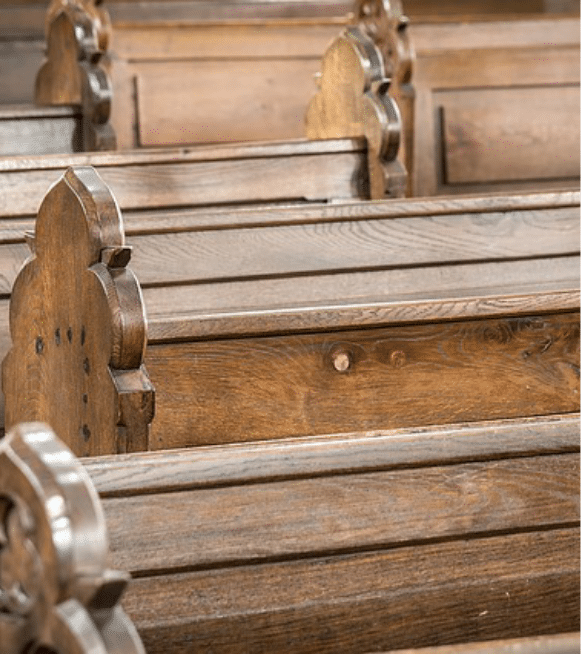John Piper kicked over a hornet’s nest. The well-known preacher and writer recently posted on X: “Can we reassess whether Sunday coffee-sipping in the sanctuary fits? ‘Let us offer to God acceptable worship, with reverence and awe.’ Hebrews 12:28.” Predictably, people lost their minds for various reasons. Of course one can drink a cup of Joe during a worship service, as long as his mind and heart are keyed into what is happening.
And what is happening, exactly? There are theological and practical sides to this question. On the practical side, several decades of “we do church differently” and “not your Grandma’s church” have left us with what one wit called “a concert with a TED Talk.” Really “getting into” worship generally has to do with a “vibe” generated by highly-orchestrated performances of music, much of which draws from pop rather than folk or high culture. That describes Divine Service for thousands if not millions today. The result is that congregants become an audience of passive consumers who can casually sip their latte without interruption (something plenty of other commentators have noticed).
Traditional vs. Modern Worship Practices
Those in more traditional forms of worship, when they hear of this behavior, confusedly ask, “How?” Whether we’re talking about traditional worship in black churches or in “high” liturgical settings (and there are plenty of contexts where both of these expressions are found together), there’s just too much to do. Kneeling, standing, sitting, clapping, raising hands, holding prayer books, and antiphonal worship in the form of call-and-response, Psalms, and prayers (chanted or otherwise)—these aren’t things you can do while hauling around your modish travel mug. Similarly, in these liturgical environments, the congregation’s voices are often the primary musical instrument, and God is supposed to be the primary Audience. One has to sing lustily, perhaps with a hymnal. Throw in old-fashioned intergenerational worship, and you’re just too busy kid-wrangling to even contemplate the kind of laid back casualness that marks the post-Willow Creek liturgical landscape.
Theological Significance of Worship
This kerfuffle has little to do with caffeinated beverages and everything to do with the fact that the “how” involves a “what” and a “why.” How we worship reflects what we think worship is and Who we think we are worshiping. More subtly, how we worship forms and shapes our theological vision. Forms of worship have the potential to alter one’s perception about Who God is, what He’s like, and what blessings, duties, and privileges we have as His redeemed people.
Biblical Foundations of Worship
Biblically speaking, God’s covenant people are summoned from the world to assemble and call upon His holy name, to confess their wickedness and wretchedness, to memorialize His dread acts of redemption, to magnify His greatness, to receive His abundant grace as found in Word and Sacrament, to render thanksgiving for His innumerable benefits (above all, His inestimable love in the redemption of the world by the Lord Jesus Christ), and to enter the heavenly precincts as His Temple, caught up in the Holy Spirit to join angels, archangels, and all the company of heaven in proclaiming, “Holy, holy, holy, Lord God of hosts. Heaven and earth are full of thy glory!”
The Gravity of Reverence
Certain ways of being a Christian are grave. They have a sobriety and weight which strongly grates against and even upsets 21st-century westerners. Such gravity emanates from a fear of God. Almost on cue these days, we like to explain away this fear. “It’s not like you’re really scared of God.” The terrified prostrations of the holy prophets and apostles would suggest otherwise. The God Who is love showed up in cloud and fire, and His hands were pierced by bitter nails on a tree that He might ransom us from the bondage of sin and reconcile us to Himself. He tenderly forms us, He sacrificially redeems us, and yet He also chastens us and judges evil. He is not to be trifled with; He is to be ceaselessly adored. And that ought to manifest in how we worship Him in the assembly. In our bearing, we ought to recognize His kavod (glory), which has to do with weight or heaviness. You know, gravity—the one thing that today’s “relevant” worship can’t seem to stand, whether “contemporary” or “liturgical.”
John Piper’s Insightful Observation
What Dr. Piper has noticed is something many of his contemporaries refuse to see: We are all in liturgical Zero G, and it’s killing us.
-The Rev. Bart Gingerich
St. Jude's Anglican Church
We are a parish of the Reformed Episcopal Church. We have been worshiping together in the greater Richmond area for over a decade. We’d love to have you join us for Christian worship in the rich Anglican tradition.




